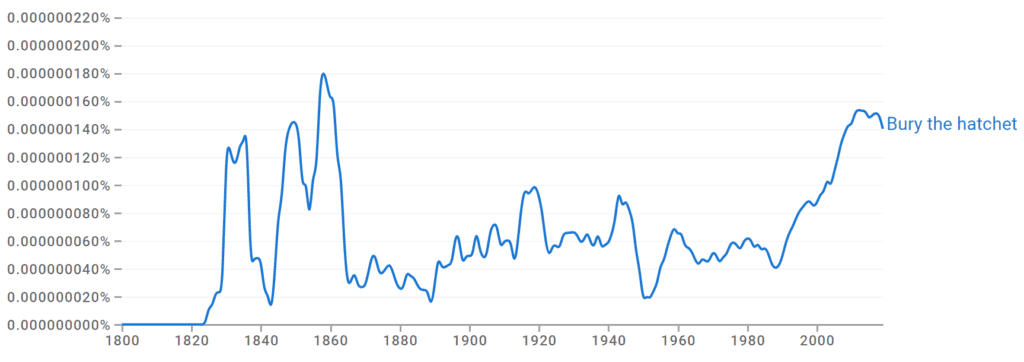Most idiomatic expressions have historical significance. For instance, burying the hatchet concerns the formation of the Iroquois Confederacy.
Read on to learn all about the meaning and origin of the idiom bury the hatchet. Plus, find out how to use it properly in a sentence through the examples I provided at the end.
What Does the Saying “Bury the Hatchet” Mean?

To bury the hatchet is an American English idiomatic expression that means to make peace. It is considered an idiom because we use its figurative definition over its literal meaning.
When you and your long-time enemy are burying the hatchet, you forgive each other and reconcile. All the arguments are forgotten, and both of you start over.
Origin of the Phrase “Bury the Hatchet”

Bury the hatchet is an allusion to the practice of throwing weapons after hostility among Native Americans. After the formation of the Iroquois Confederacy, it was customary to bury weapons once peace was declared.
Stanford University recently blocklisted bury the hatchet along with other idioms because it appropriates “a centuries-old tradition among North American indigenous peoples.”
Other Ways to Say “Bury the Hatchet”
Some idiomatic expressions related to bury the hatchet include starting with a clean slate, kiss and make up, and water under the bridge. You can also use the term let bygones be bygones.
When you start with a clean slate with someone, you can begin a process again without considering what has happened in the past.
We use the idiom kiss and make up to refer to being friendly again after a fight or disagreement.
Water under the bridge refers to a situation in the past that is no longer important.
Let bygones be bygones is another idiom that means to forget past offenses or conflicts.
“Bury the Hatchet” in a Sentence
- After years of bitter feuding, the two rival companies decided to bury the hatchet and merge.
- In order to move forward, the couple knew they needed to bury the hatchet and put their past differences behind them.
- After a heated argument, the friends realized they had to bury the hatchet and make amends.
- The nation’s leaders knew that in order to bring peace, they had to bury the hatchet and put aside their past conflicts.
- In order to rebuild their relationship, the siblings knew they needed to bury the hatchet and forgive each other.
- Swift had even formed a fragile friendship with West and his new wife, seemingly eager to bury the hatchet after the 2009 VMA episode in which West interrupted Swift’s acceptance speech to inform the award show’s nine million viewers that Beyoncé had “one of the best videos of all time.” (Rolling Stone)
Bury the Hatchet: A Recap
Bury the hatchet is an idiomatic expression that means to make peace with an enemy.
Despite its positive definition, bury the hatchet may be considered problematic because it appropriates Native American practices. Consider alternative idioms like let bygones be bygones or kiss and make up.
